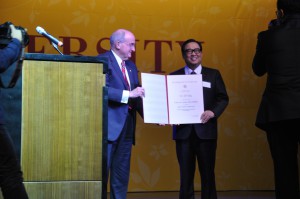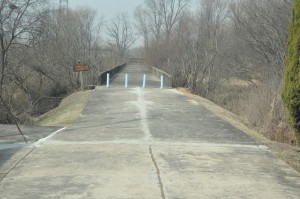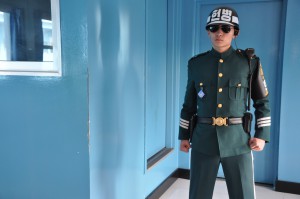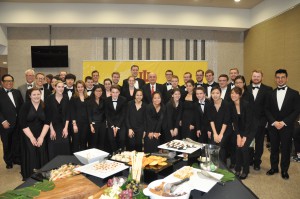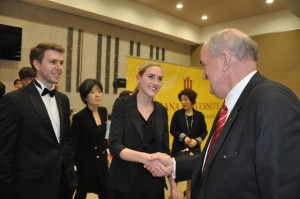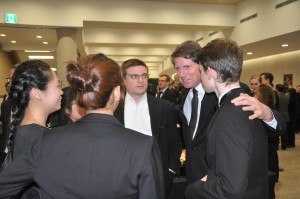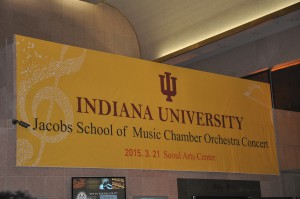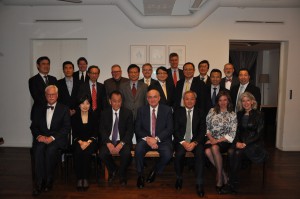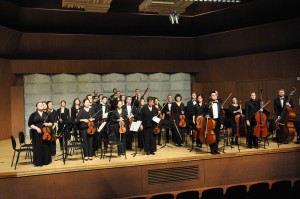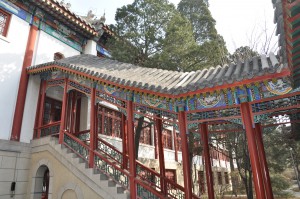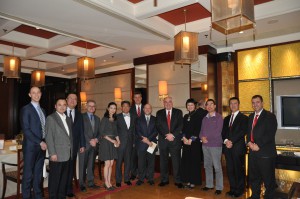Korea in cream and crimson
From the moment members of the IU delegation stepped foot in Seoul just a few short days ago, it was clear this trip would be like no other, a fact owed in large part to the power of IU’s proud and amazingly active Korean alumni.
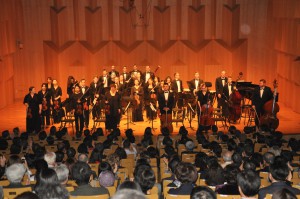
Members of the Indiana University Chamber Orchestra culminate their historic Asia tour with a sold-out performance at Seoul Arts Center.
Following the IU Jacobs School of Music’s historic Asia debut – a stirring run of four performances in five nights, culminating in a final landmark concert at legendary Seoul Arts Center – and numerous meetings with IU’s many strong Korean connections in between – it was only fitting that we concluded our memorable journey through Asia with a major celebration of the many graduates of IU now living, thriving and making a positive impact here in South Korea.
As IU President Michael A. McRobbie told the over 250 IU Korean alums in attendance at last night’s special gathering in downtown Seoul, the nearly 1,000 Korean students who studied at IU last year and the 4,000 IU alumni who are affiliated with Korea are a vital part of the life of IU. Their ongoing engagement with their alma mater continues to give more Hoosier students the opportunity to travel overseas to study in an increasingly influential country with incredibly rich history and culture. And they have helped to expand the university’s academic and cultural programs back home through the support of such new developments as IU’s first-ever endowed chair in Korean Studies, which will enhance IU’s effort to be the premier place for the study of contemporary Korea.
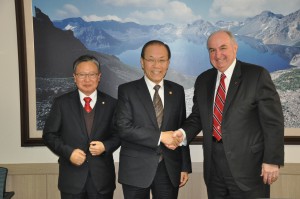
IU President Michael A. McRobbie shakes hands with Hwang Woo-yea, South Korean deputy prime minister and minister of education. The two talked about IU’s longstanding engagement in Korea and potential future collaboration.
Make no mistake: Korea is awash in cream and crimson. No matter where members of the IU delegation traveled – whether to Seoul’s top universities, which are among the best in the world, or to the office of the Minister of Education, which requested a special audience this morning with delegation members today to praise IU’s involvement here – an IU alum cropped up with a story to tell about his or her time in Indiana, the impact of an IU education and the lasting friendships made while studying on the university’s campuses.
President McRobbie is fond of saying that IU graduates are among the most “dedicated and loyal” to their alma mater of any that he’s encountered in his travels. Here in Seoul, that dedication and passion is nearly off the charts. Indeed, their pride in their alma mater was palpable during our trip to Seoul this week – no more, perhaps, than at Seoul Arts Center, as they watched the young men and women from the IU Chamber Orchestra, including seven students for whom this trip served as a homecoming, deliver a sensational performance at one of the world’s premier concert venues.
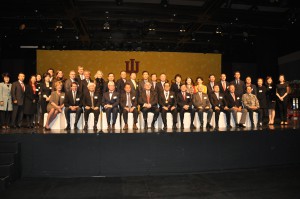
IU’s Korean alumni pose for a picture with IU President Michael A. McRobbie and other delegation members.
The trip to Seoul allowed members of the IU delegation the opportunity to express their own gratitude for the contributions IU’s Korean contingent has made and continues to make to enriching, enlivening and diversifying IU’s campus culture and empowering IU’s effort to be one of the world’s most international universities as it approaches its third century of operation. (When IU celebrates its bicentennial in 2020, it will truly be a global affair!)
At last night’s celebration, President McRobbie expressed the university’s appreciation to one alumnus in particular – Dr. Se-Ung Lee – for the “extraordinary” service he has rendered to IU and the difference he has made at the university – both for Korean and Hoosier students. Dr. Lee was the founder and president of Korea Industrial Gases, one of South Korea’s leading manufacturing companies, and he is widely recognized as a business innovator and for his major contributions to education. He has enthusiastically supported the international development of universities around the world—including IU—and through his dedication to international exchange, he has made possible opportunities that have been transformative for faculty, students and administrators at IU’s campus in Kokomo, Ind.
In honor of Dr. Lee’s support of IU’s international engagement, and in recognition of his efforts to help IU students and faculty expand their global horizons, President McRobbie presented him with the Thomas Hart Benton Medallion, an award given to individuals who have achieved a level of distinction in public office or service and have exemplified the values of IU.
For his part, Dr. Lee was quick to share his new distinction with all of IU’s Korean alumni, who, time and again on this memorable trip to Asia, demonstrated just how powerful the IU connection is around the globe.
“The spirit of IU may seem like it is thousands of miles away,” McRobbie said to those who attended tonight’s celebration, which culminated in a rousing performance of traditional Korean dance and music. “But it is also right here in this room tonight, with you, some of our most dedicated Korean alumni. You are part of the spirit of Indiana University, and your successes are the university’s successes.”
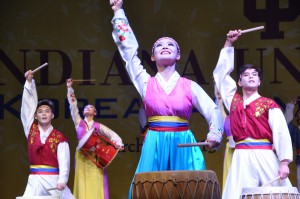
A celebration of IU’s Korean alumni concluded, fittingly, with a rousing performance of Korean music and dance.
As hard as it will be to leave our many Korean friends, members of the IU delegation can take heart in knowing that the spirit of IU is alive and well in Seoul. And while our journey here is now complete, we can in fact look forward to many new beginnings as IU continues its harmonious engagement in this wonderfully dynamic part of the world.
As I say ahn nyeong – or goodbye – from Seoul, I leave you with one last parting gift – the final performance of the IU Chamber Orchestra’s historic Asian debut at Seoul Arts Center. Enjoy, and see you back home in Indiana!
Tags: Dr. Se-Ung Lee, IU alumni, IU Alumni Association, IU Chamber Orchestra, IU Kokomo, Jacobs School of Music, Kokomo, Korea, Michael A. McRobbie, Minister of Education, Seoul, Seoul Arts Center, Thomas Hart Benton Medallion
A day of history and harmony
I had one foot in North Korea today.
While the student musicians in the IU Chamber Orchestra were busy practicing for the final performance of their historic tour of Seoul, members of the IU delegation here to support them took an early-morning trip to one of the last real remnants of the Cold War and a place that former U.S. President Bill Clinton once famously described as “the scariest place on earth.”
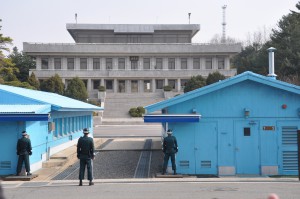
Panmun Hall, the main building managed by the North Koreans in the Joint Security Area of the Korean Demilitarized Zone. The blue United Nations houses straddle the demarcation line between South and North Korea.
About 2.5 miles wide, the Korean Demilitarized Zone –or DMZ – effectively divides North and South Korea on an angle around the legendary 38th parallel north. Established at the end of the Korean War in 1953, it is the most heavily fortified border in the world, its landscape dotted with watchtowers and guard posts, barbed wire and bunkers, landmines, tanks and tunnels. On either side of this rugged piece of empty no-man’s land stand thousands of troops from both sides of a conflict that hasn’t technically ended (the two nations have never arrived at a final “peaceful settlement”) and continues to keep soldiers on the highest of possible alerts should war ever break out again.
As mentioned on several occasions by our U.S. soldier tour guide, who, in pure coincidence, just so happened to be a 20-year-old Hoosier from New Albany, Ind., conflict can break out at any time, and, indeed, the DMZ has experienced a considerable share of deadly skirmishes over its more than a half-century in existence. Most famously, in 1976 two U.S. Army officers were brutally killed by North Korean soldiers in the Joint Security Area of the DMZ, where IU’s delegation was today, in what is now known as the “Axe Murder Incident.” Another incident took place in 1984, when a Russian tourist ran across the military demarcation line shouting that he wanted to defect. Violent outbursts along the DMZ, initiated by North Korean hostilities, reportedly killed more than 500 South Korean and 50 U.S. soldiers between 1953 and 1999.
At the DMZ, stone-faced soldiers from both sides literally square off against one another. At the Joint Security Area – or JSA – where all joint negotiations have been held since 1953, there are soldiers stationed along what’s known as “Conference Row,” keeping careful watch on one another for even the slightest threatening action or gesture. To this end, we in the IU delegation are repeatedly told to keep our head and hand movements to a minimum, any “scoffing” invisible and our camera lenses aimed low to avoid provocation. We’re also asked to sign disclaimers at the start of our tour, stating that we recognize our safety cannot be guaranteed.
Today’s tour took us to DMZ areas where the quiet calm belied the true tension in the air. Those areas included the southern side of the JSA, where we were led into one of the trademark blue United Nations buildings that straddle the demarcation line and where one can briefly step into one of the world’s most closed-off countries, while U.N. forces steadfastly guard the doors. Once back outside, we were given a direct view of Panmun Hall, the main building managed by the North Koreans in the JSA. Its gray steps and three stories confront South Korea’s Freedom House.
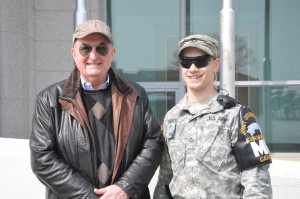
IU President Michael A. McRobbie poses for a picture with an Indiana serviceman who led the IU delegation’s tour of the DMZ.
Our tour also brought us to the site where the “Axe Murder Incident” took place, now marked with a monument, and another area that offered us a high-up view of the infamous “Bridge of No Return,” which crosses the demarcation line between North and South Korea. Used for prisoner exchanges at the end of the Korean War, its name reflects how many prisoners captured by the U.S. didn’t want to return home. When brought to the bridge, which has not been used for prisoner exchanges since 1968, prisoners were offered the choice to remain in the country of their captivity or cross over to the other country. If they chose to cross the bridge, however, they would never be allowed to return. (A side note: During his 1993 visit to South Korea, President Clinton walked on the bridge, chatting with military personnel stationed just a few feet from North Korea and venturing closer to that country than any other president ever had.)
Finally, we made the trek back to our starting point, Camp Bonifas, the military post named in honor of Captain Arthur Bonifas, one of the two Americans killed in the axe murder. On our way, we scanned the sweeping brown fields to find world’s third-tallest flagpole, which flies a North Korean flag over Kijong-dong, a peace village situated in the northern half of the DMZ, one of two villages permitted to remain in the zone; the other is the South Korean village of Daeseong-dong.
Up until 2004, massive loudspeakers mounted on some of the buildings in Kijong-dong used to blast loud North Korean propaganda messages toward the south. On the hour-long trip back to Seoul, I could only imagine how the South Korean and U.S. soldiers who were here back then felt having to hear those sounds day after day, just as I wondered what it must be like to live in an area of the world that is continually on the brink. As one IU alumnus told me last night, somewhat jokingly, but also with some solemnity, “If Americans really understood just how close we are to danger, they might never come to Seoul.”
A harmonious performance
Hours after we’d departed the DMZ, we had the pleasure of hearing far more pleasant sounds when the IU Chamber Orchestra took the stage at the chamber music hall of the majestic Seoul Arts Center, Korea’s equivalent of Manhattan’s legendary Lincoln Center. Will all due respect to each of the orchestra’s terrific appearances earlier in the week, its members saved their best performance for last, rising to the historic occasion with a concert that wowed an enthusiastic sold-out audience. That audience included more than 170 IU Jacobs School of Music alumni, as well as families and friends of the seven members of the orchestra for whom this trip is a homecoming.
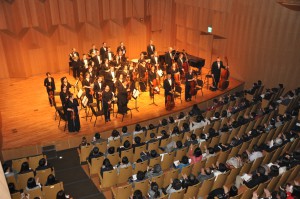
Members of the IU Chamber Orchestra culminate their tour of Korea with a sold-out performance at Seoul Arts Center.
The students sounded so good, so remarkably seasoned and poised, and so seemingly undaunted by their storied surroundings. (Approximately 40 million visitors have walked through the doors of the center, which is celebrating its 25th anniversary this year.) Fittingly, for their final piece on this historic tour of Seoul, they chose to perform the traditional Korean folk song that they unveiled earlier in the week at Seoul National University. The piece was arranged by Jacobs School of Music alumnus and current master’s composition student Ari Fisher, who, amazingly, is only 23 years old.
Most of the three dozen students who performed here at Seoul Arts Center are even younger than Fisher, and it was clear watching them in three of their four performances in Seoul, talking to a few of them at a post-concert reception last night and following their adventures on their own blog site, that they were having the time of their lives. If they felt the burden of being ambassadors for the Jacobs School of Music, Indiana University and the state of Indiana, it certainly didn’t show.
”These young people made us so proud tonight,” said Jacobs School of Music Dean Gwyn Richards. “They traveled together, made music and new memories together, and all the while served as great ambassadors of Indiana University. So rich and filled with promise is this moment – a moment that together they defined.”
In greeting the audience from the stage prior to the concert, IU President Michael A. McRobbie referenced Daniel Barenboim, a Nobel Peace Prize-nominated conductor and pianist. In 2013, Barenboim led a four-night presentation of the complete Beethoven symphony cycle at Seoul Arts Center. The next day he performed a peace concert in Imjingak on Korea’s Liberation Day. “Music may not be a problem solver,” McRobbie quoted Barenboim as saying, “but it can be a source of passion and interest that facilitates dialogue.”
Indeed, the hope by all in the audience this evening was that the performance by IU’s remarkable student musicians would serve to unite us all, inspire deeper discussion and make the world more harmonious.
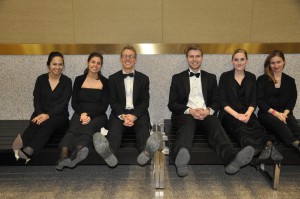
IU’s student musicians enjoy a well-earned rest after performing four historic shows in Seoul over five nights.
Tags: Ari Fisher, Axe Murder Incident, Bridge of No Return, DMZ, Gwyn Richards, Indiana University, IU alumni, IU Alumni Association, IU Chamber Orchestra, Jacobs School of Music, Joint Security Area, JSA, Korean Demilitarized Zone, Korean War, Michael A. McRobbie, North Korea, Seoul, Seoul Arts Center
Stars, stripes … and strings in Seoul
“The Star-Spangled Banner” doesn’t quite resemble your typical chamber music repertoire, but it served as a most appropriate song selection for another historic and special occasion for Indiana University here in Seoul.
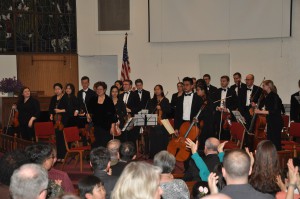
Members of the IU Chamber Orchestra perform at U.S. Garrison Yongsan, the headquarters for the U.S. military in Korea.
Members of the IU Chamber Orchestra continued their Asian debut in Seoul with a concert this evening at U.S. Garrison Yongsan, the headquarters for the U.S. military in Korea. Performing in front of American servicemen and servicewomen and their families, as well as South Korean military personnel, the 36-member student ensemble from IU’s renowned Jacobs School of Music, led by Jacobs faculty members Jorja Fleezanis and Stephen Wyrczynski, delivered a skillful and spirited show that, just like the group’s concert earlier this week at Seoul National University, left the audience standing and smiling in appreciation.
For IU’s talented young musicians, who spent a good part of the afternoon practicing at the base, the performance presented a wonderful opportunity to show their appreciation for the men and women who serve our country.
Indeed, this evening was truly about our Seoul-based military personnel who have worked tirelessly to preserve the peace in Korea and ensure a strong alliance between Korea and the U.S. Among them are at least two Hoosiers serving at Yongsan Garrison: Col. Shawn Stroud, a public affairs officer for the Eighth Army in Korea, who earned his master’s degree in kinesiology from the former the School of Health, Physical Education and Recreation, which is now known as the School of Public Health; and Col. Kenneth Newlin, an Indiana native and member of the Indiana Army National Guard, who is on a deployment as the command engineer for U.S. Special Operations Command-Korea.
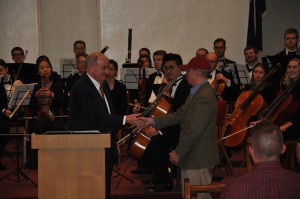
IU President Michael A. McRobbie shakes hands with base commander and retired Army Col. Henry Paul Stuart.
After the playing of the national anthem and a warm IU welcome from Jacobs School Dean Gwyn Richards, IU President Michael A. McRobbie thanked the military members in attendance for their “exemplary service to our country.” He also saluted their “resilience” in the face of major change and upheaval. (The U.S. military is expected to relocate operations outside central Seoul later this year. Once the base is vacated, it will turn into a massive urban park.)
McRobbie concluded his remarks with a perfectly timed patriotic gesture, presenting base commander and retired Army Col. Henry Paul Stuart with a “challenge coin” commemorating the repatriation of the original prow of the USS Indiana battleship, which served in the Pacific during World War II and was the last ship to be named for the Hoosier state. (Per military tradition, commanders give out challenge coins in recognition of outstanding achievement by members of their unit and to build camaraderie and morale.)
With morale already high in the concert space and the orchestra ready to begin its program, Stuart offered a fitting response to McRobbie’s friendly “challenge,” quickly donning a red Jacobs School of Music hat and happily displaying it to an audience that, for the next hour, would be treated to the very best of IU’s acclaimed musical tradition.
It was nothing short of a command performance.
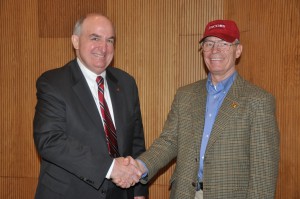
President McRobbie and Ret. Col. Stuart pose for a picture after a rousing IU Chamber Orchestra concert.
Tags: Gwyn Richards, IU Chamber Orchestra, Jacobs School of Music, Jorja Fleezanis, Korea, Michael A. McRobbie, School of Public Health, Seoul, Seoul National University, Stephen Wyrczynski, U.S. Army Garrison Yongsan
IU’s Korea connection
It’s only taken members of the IU delegation about 48 hours to discover that Hoosier spirit is alive and strong in Seoul.
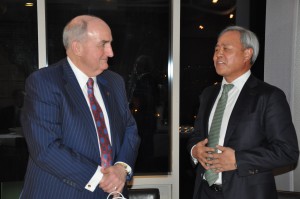
IU President Michael A. McRobbie shares a moment with IU Kelley School of Business alumnus William Joo, chairman of the successful Seoul-based MediaWill publishing company.
That spirit is reflected in a local alumni base totaling more than 1,400 IU international graduates, many of whom have gone on to leadership positions representing almost every area of Korean society, including the arts, business, education, government, medicine and more.
Worldwide, IU now boasts more than 3,600 alumni affiliated with Korea (a number second only to China), and the university continues to welcome around 1,000 Korean students to its campuses each year. In turn, IU continues to send a sizeable number of its own students to Korea for meaningful study abroad experiences in one of the world’s most dynamic and culturally rich countries.
Many of these exchanges have been facilitated by IU’s carefully executed partnership agreements with Korea’s premier universities, including Yonsei University, Sungkyunkwan University, Seoul National University and Ewha Womans University. IU continues to seek ways to further its collaborative activities with each of these institutions in an effort to provide more overseas opportunities for its students and faculty and to encourage foreign scholars to bring their talents, ideas and unique cultural perspectives to its campuses across Indiana. (IU welcomes around 100 visiting foreign scholars from Korea annually.)
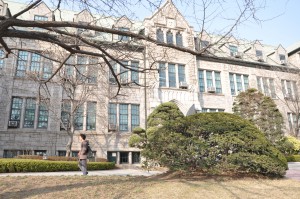
IU’s partnerships with Korean universities such as Ewha Womans University offer promising opportunities for student and faculty exchanges.
While all of this is impressive, of course, it only tells part of the story about the ongoing impact of IU’s successful Korea connection.
IU alumni living in Seoul are well known to be among the university’s most active, engaged and passionate graduates, whether they’re supporting a group of student musicians making history, suggesting new exchange programs or simply reminiscing about their time at IU, the lessons they took home with them and friendships they made.
They’re also immensely proud of their alma mater. Talk about the many positive developments at IU, and their eyes light up. One might think being thousands of miles away, they’d be content with the time they had at IU. But it’s not enough. They want more – but not for themselves. They truly want others to have the experiences they had. They are eager to open their doors to more IU students seeking overseas study opportunities. They want to send more Korean students to IU, recognizing the value of an IU education and, perhaps more importantly, the importance of bridging cultures in a global marketplace that technology has brought closer together than ever before.
This evening, members of the IU delegation had the opportunity to dine with leaders of IU’s successful Korea alumni chapter. The conversations ranged from talking about IU’s newly launched schools, such as the School of Global and International Studies and Media School, new faculty hires and stories of major student achievement to how well the Hoosiers would fare in the upcoming NCAA basketball tournament.
The IU pride in the room was palpable, and I can now confirm what’s been said often, but probably not enough: IU alumni truly are the university’s greatest global ambassadors.
Tags: Ewha Womans University, IU alumni, IU Alumni Association, Jacobs School of Music, Korea, Seoul, Seoul National University
The sounds of opportunity in Seoul
Back home in Indiana, it’s spring break. But don’t tell that to the 36 student musicians in the Indiana University Chamber Orchestra, who have been tasked with making history this week here in Seoul, South Korea.
Part of the first-ever Asian tour by IU’s world-renowned Jacobs School of Music, the students, who are led by Jacobs faculty members Jorja Fleezanis and Stephen Wyrczynski, are showcasing their talents to various Korean audiences in four performances over five nights, all while serving as global ambassadors for their university and squeezing in a bit of Korean culture when they’re not busy practicing and performing.
Still feeling the effects of a 14-hour plane ride, they somehow managed to deliver a stirring performance Wednesday afternoon at prestigious Seoul National University. The 400-member audience included IU President Michael A. McRobbie and his fellow delegation members, standing and applauding enthusiastically at the time of the final bows.
From the opening notes of Rossini’s “Overture to Il signor Bruschino” to the surprise encore of a specially arranged Korean folk song that brought knowing smiles to the faces of the many Korean students in the concert hall, it was clear that a little jet lag, cool rain and clouds weren’t going to dampen the spirit of this momentous occasion for IU and SNU, as they seek to grow a longstanding collaborative relationship.
Just minutes before the IU Chamber Orchestra took the stage, the deans of IU’s top-ranked Jacobs School and the internationally acclaimed College of Music at SNU signed a partnership agreement that will help initiate new exchange programs for students and faculty in the areas of music education, performance and research, and could also lead to the development of joint programs and projects.
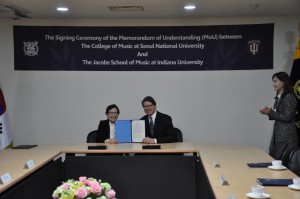
Kim Kwi Hyun, dean of the College of Music at Seoul National University, and IU Jacobs School of Music Dean Gwyn Richards display a newly signed partnership agreement between their respective schools.
For now, though, the students who have given up their spring break to come halfway across the world to Korea can bask in the glow of this afternoon’s rousing performance and an artistic, cultural and educational experience they’ll take with them wherever they go after leaving IU. For seven members of the orchestra, the trip reflects a homecoming, making it extra special.
“The decision to take a gifted group of our students outside the United States to perform is, in and of itself, a tremendous vote of confidence to them and to the school,” Fleezanis had said prior to the performance. “Leaving their home turf of Bloomington to face audiences in a major international city will spark a level of growth and confidence like no other they will receive during their time in school. It will teach them the importance of art as the universal language and provide perspective.
The IU Chamber Orchestra will be back at it on Friday for what’s bound to be a memorable performance for U.S. military personnel stationed at U.S. Army Garrison Yongsan. Its members will culminate their historic trip the following evening with a concert at the Seoul Arts Center, Korea’s foremost art and culture complex.
“The tools and skills [the students] have attained at the Jacobs School of Music will carry them through this exciting week of four performances in four different venues,” Fleezanis added. “They will be forever changed by this.”
A reminder: Check the Jacobs School of Music special South Korea Trip 2015 blog for stories and perspectives from members of the IU Chamber Orchestra as they tour Seoul.
Tags: Indiana University, IU, IU Chamber Orchestra, Jacobs School of Music, Jorja Fleezanis, Korea, Michael A. McRobbie, Seoul, Seoul National University, SNU, Stephen Wyrczynski
A powerful prelude in Beijing
All it takes is a day in Beijing (which is about all the time the IU delegation will spend here before heading on to Korea) to see and feel the major impact the university’s international engagement efforts are having on IU students, faculty, alumni and friends.
Indeed, in the span of just over 24 hours, IU President Michael A. McRobbie and his fellow delegation members experienced, albeit briefly, what it means for IU students to have the opportunity to study abroad in a city that dates back three millennia and continues to be the political, cultural, economic and educational epicenter of the world’s most populous nation.
They saw, first-hand, the impressive contributions IU faculty have made – and continue to make – to scholarly discussions and debate about the most important issues facing the global community.
They reconnected with the university’s proud past via IU’s ever-growing cohort of international alumni, whose cultural contributions to IU’s campuses are matched only by the successes they’ve gone on to have in their lives and careers, and the pride they feel in forever being Hoosiers.
And they gained a positive glimpse of the future, courtesy of several productive discussions about possible collaborations that could bring about greater faculty and student exchanges and exciting new academic degree programs.
The delegation’s short layover in Beijing, which encompassed visits with IU students, faculty and alumni, and meetings at China’s prestigious Peking University, was set up to be a prelude of sorts to several historic upcoming concerts this week in Seoul, South Korea, by IU’s world-renowned Jacobs School of Music. But the brevity of the China portion of the trip didn’t stop big activities from happening in Beijing.
Here are a few of the highlights of a whirlwind day in China’s capital city:
A rousing dinner: Want to quickly jettison your jet lag after a 14-hour flight? Go to dinner with Grace Jaroscak, Kelly McCarthy and Eleanor Wannemuehler. The three IU students, who are studying in Beijing as part of the IU Chinese Flagship Program (and will all graduate this year), talked enthusiastically and passionately Monday evening about their work and travel here, including the time they’ve spent learning the complex Chinese language; getting acquainted with Chinese culture and history; experiencing the vastly different regions of the world’s largest country; and even managing to partake in some fun extracurricular pursuits. (Who knew you could learn to swing dance in China?)
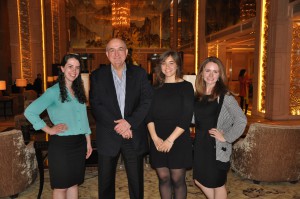
IU President Michael A. McRobbie poses for a picture with IU students Grace Jaroscak, Kelly McCarthy and Eleanor Wannemuehler. All three are studying in China this year.
“China in the Middle East”: President McRobbie delivered the opening remarks at this two-day conference being hosted by Peking University and the IU China Office, one of IU’s two new global gateway facilities and the home base for all of its activities and outreach here. With its longstanding connections in the Middle East and as a home to a large and well established Muslim population, China will continue to be a major player in Middle Eastern affairs. As a result, researchers from Indiana, the nation and the world will have “unprecedented opportunities,” according to McRobbie, to learn more about China’s important interactions in this tumultuous region. The conference served as a “wonderful example,” McRobbie added, “of how cooperation between Indiana University faculty and colleagues in China can lead to the realization of admirable goals that can improve research and scholarship in both our countries and can benefit scholars and institutions around the world.”
More potential at PKU: Peking University and IU’s Bloomington campus are both rightly recognized for the beauty of their respective campus grounds and traditional architecture. But the similarities between PKU and IU go beyond simple aesthetics. The two premier teaching and research universities have been productive partners since the 1990s, with strong connections in history, medicine, the humanities and graduate education.
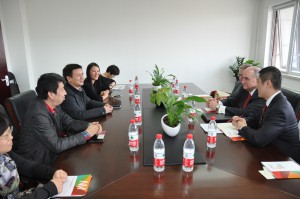
Members of the IU delegation meet with their counterparts at Peking University’s School of New Media.
Today’s trip to PKU served to strengthen the longstanding relationship between the two schools, while also signaling potential new areas of collaboration, such as arts administration and music, international studies and mass media, that could open up many new learning and exchange opportunities for IU students and faculty. A tour of PKU’s new School of New Media, launched last year just a few months before IU introduced its Media School, was particularly illuminating and inspiring. The school’s guiding philosophy – focused on the convergence and creative development of all types of media – neatly matches that of IU’s new school, which continues to enhance its curriculum to give students full exposure to modern communications.
IU’s Chinese alumni: A stop in Beijing wouldn’t be complete without checking in with IU’s proud Chinese alumni. Listening to them talk and reminisce at the end of a busy day highlighted how much even a quick stop-in visit means to IU’s growing number of global graduates – there are now more than 4,000 IU alumni affiliated with China living around the world – who are eager to share their memories of their time at IU, the lessons they learned and the friendships they made while there.
To this end, I happily reconnected with one of my former journalism classmates, whom I hadn’t seen in 16 years, and who had taught me and her fellow students many lessons about her country and its culture. It was a nice reminder that, as much as an IU education means to foreign students who travel to Indiana from far away places like China, the contributions they, themselves, make to our campus communities and the bonds they form can be just as meaningful.
Tags: Beijing, China, China in the Middle East, Chinese Flagship Program, IU alumni, IU Alumni Association, IU China Office, IU Media School, Jacobs School of Music, Korea, Michael A. McRobbie, Peking University, Seoul
A musical and spirited journey
Arts, music, education and Hoosier pride will converge halfway across the world next week, and Indiana University will play a central role in all of it.
As part of its continued engagement with countries central to its mission of expanding overseas opportunities for its students and faculty, diversifying its campus culture and establishing new connections with its international alumni, IU will be part of several major events and activities – in China and South Korea – that reflect the university’s ever-growing global impact.
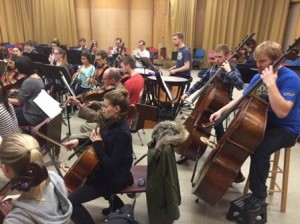
Members of the IU Jacobs School of Music Chamber Orchestra rehearse for their upcoming tour of South Korea.
Those happenings include the first-ever Asian tour of the IU Chamber Orchestra, which will travel to Seoul for a series of high-profile concerts. The student-ensemble, part of the world-renowned Jacobs School of Music, will perform at Sookmyung Women’s University and Seoul National University before entertaining American military personnel stationed at U.S. Army Garrison Yongsan. The visit, which will be a homecoming for several of the Jacobs School students, will culminate with a concert at the Seoul Arts Center, the country’s foremost art and culture complex.
An IU delegation, led by IU President Michael A. McRobbie, will have the privilege of being on hand for three of those historic performances. While in Seoul, President McRobbie and his colleagues, including yours truly, also will meet IU alumni, spend time with Hoosiers serving in the U.S. military and attend meetings at several of Korea’s leading institutions of higher education, including Seoul National University and Ewha Womans University.
These and other activities will come after delegation members make a short but busy trip to China, where they will meet up with IU students studying in Beijing as part of the university’s Chinese Flagship Program, take part in a “China in the Middle East” conference, meet with senior leaders and faculty at Peking University, one of the country’s premier universities, and visit the IU China Office, which serves to facilitate the IU community’s engagement with the world’s most populous country.

The IU China Office in Beijing serves as a central hub of IU’s many connections to the world’s most populous country.
IU has a long history of deep engagement with both China and Korea, dating back many decades and encompassing productive partnerships with a number of Asia’s top universities. Many of IU’s students, faculty and staff have close personal and professional ties to both countries. The more than 3,500 Chinese students and 900 Korean students who study at IU are a vital part of the life of the university, and both countries are popular destinations for IU students who study abroad. What’s more, the thousands of Hoosier alumni who are from China and Korea continue to serve as great global ambassadors for the university and the proven impact of an IU education.
I’ll be chronicling IU’s time spent in Asia, delivering first-hand, real-time reports of some of our daily activities here on this blog, but I won’t be the only one narrating portions of the trip. Several of the members of the student orchestra will also be sharing their stories and perspectives of their time in Seoul at a special Jacobs School of Music blog. I encourage you to check in frequently with these young performers who will have the opportunity of a lifetime to showcase their exceptional talent with an international audience.
Of course, I also hope you’ll follow me on this musical and spirited journey through this important part of the world, one that promises to further strengthen IU’s position as one of the nation’s most internationally focused universities.
Please feel free to reach out to me directly with questions at rpiurek@iu.edu.
First stop: Beijing. See you soon!
Tags: Beijing, China, China in the Middle East, Chinese Flagship Program, Ewha Womans University, Indiana University, IU, IU alumni, IU Alumni Association, IU Chamber Orchestra, IU China Office, Jacobs School of Music, Korea, Michael A. McRobbie, Peking University, Seoul, Seoul Arts Center, Seoul National University, Sookmyung University, U.S. Army Garrison Yongsan



